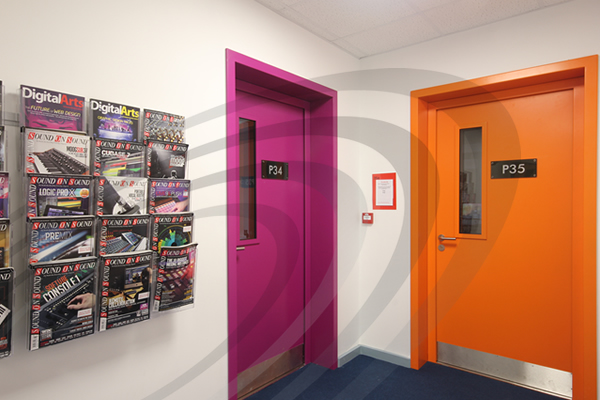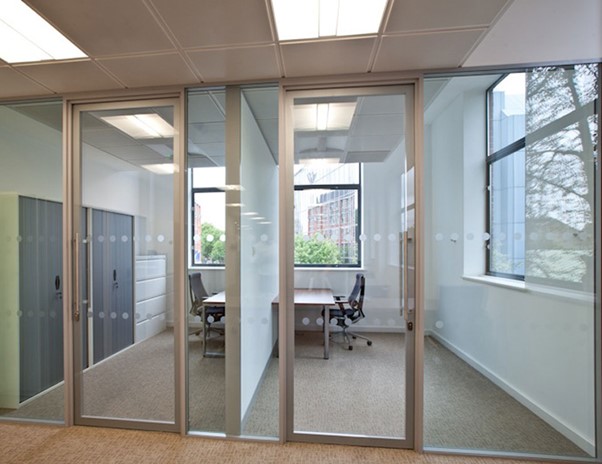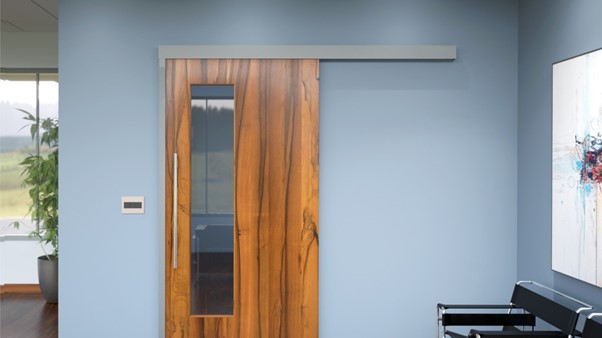Acoustic doors
Acoustic doors
Quality of life requires increasingly strict standards; to protect people and/or their environment. One of the problems faced is sounded hustle. That will be annoying and produce noise most times so sound insulation is applied to maximize the acoustic performance.
In our buildings, while walls block sound waves noise is basically transmitted through doors.
If doors do not meet the same acoustical requirements as the rest of the room, then the sound will easily pass through it to adjoining spaces. When fitted with the right door and sealing systems, the noise will be contained and controlled.
An acoustic door is a solid, heavily framed door which most often includes seals around its edges and has insulated construction to reduce noise and vibrations from passing through its surface. Depending on the application and the design. There are many types and grades of acoustic door available for assorted applications and industries.
These doors can have a variety of purposes, such as enabling confidential discussions to be held inside a room without the risk of those outside overhearing and allowing noisy activities to take place, such as music rehearsals, without nearby rooms and areas of the building being disturbed. Music studios are one environment which typically makes use of acoustic doors. When audio is being recorded it is important that external noises do not interfere with the sound being captured. The control room with producers and engineers inside it needs to be isolated, and each room in the studio must contain its own noise levels successfully to avoid disturbing those in neighbouring rooms. Sound insulation in these settings is not an optional extra, it is absolutely essential for the functionality of the building. In the audio recording industry, the acoustic door serves a special purpose since unwanted noise needs to be avoided in a successful recording session. In a recording studio you may have several rooms or booths that are designed for specific tasks. The studio control room has an acoustic door so the engineer and producer can be isolated from the additional rooms and parts of the studio while allowing these individuals to travel between locations. Sometimes these doors will be transparent containing multi-pane glass panels in the center so that individuals on each side can see each other easily.
Acoustic doors are vital to properly insulate the sounds inside a room. The combination of the doors’ solid build, their edge seals and the frame, along with the insulated engineering within the body of the door, all contribute to a significant reduction in the vibrations and sound that pass through it. Sometimes an acoustic door is solid steel or wood with an insulated core to achieve maximum quiet when transparency is not necessary. A door of this style is quite often used in an examination room at a doctor’s office where a conversation between the doctor and patient requires total privacy.
Another logical home for an acoustic door could be a conference room at a corporate office where information concerning product development, human resources or business strategy would be discussed. Counselling centres, police station questioning rooms, and testing facilities or anywhere where privacy and confidentiality are essential, can be included as an application for this type of door. Another work environment where acoustic doors are increasingly commonly used are medical or healthcare premises. When patients talk in confidence to their doctor, nurse or counsellor they have an expectation of privacy and discretion. Compromising this, and their trust in the service or staff they are working with, by having doors which allow sound to penetrate through could have a detrimental impact on their relationship with their physician or healthcare worker, so if they can overhear a doctor’s discussion with another patient through the door, they will have no faith that their own personal conversations and concerns are being kept private.
Another scenario where acoustic doors can provide considerable benefit is for corporations or businesses who have meetings where sensitive information is discussed. This might include meetings about staffing and human resources, product development, grievance procedures or business strategy; all of which could have a negative effect if overheard. Even if just a snippet leaks out of the room, assumptions can be made and confidences broken, so mitigating against this risk by installing acoustic doors can make situations easier to manage, and keep sensitive information to within the appropriate group of people.
Factories or businesses which house heavy machinery are also prime candidates for benefiting from an acoustic door. The business owners can promote positive aural health by limiting loud noises to one part of the premises where adequate hearing protection is used. Preventing this noise from leaking to other sections of the building will make it a more pleasant, as well as safer, place for employees and managers to be.
Production departments or facilities that contain heavy machinery, tooling or motorized activity usually have acoustical doors throughout the location to keep hazardous sound levels out of populated areas. A large manufacturing plant may use an acoustic door to establish privacy and protection for managers required to monitor productivity on the main floor. A newspaper will use acoustic doors and panels to dampen the sound of large printing presses while allowing a passageway for pressmen and technicians to maintain and operate the machinery.
Logically, any facility where sound needs to be separated from people, places or things to ensure safety, privacy, or productivity and still provide a method of passage between two or more locations, will need a door of this type. A good look around our individual environments should help us notice with more clarity a number of uses for the acoustic door.
Soundproof acoustic doors which commonly made from wood are an ideal cost-effective Acoustima® acoustic panel by Seatup Turkey® solution because it does not need much coating but absorbs sound by its self moreover, they are suitable for a wide variety of applications in any room, office or hall.
They are tested to ISO standards and achieve an average level of sound reductions up to 55dB. according to durability and sound transmission loss, other requirements may also apply, such as fire resistance and high thermal insulation.
Acoustic doors are designed to reduce the escape of noise and vibrations from one room to another. With a multitude of potential uses in a wide variety of industries and sectors, these doors are available in different decibel ratings to cater for the needs and requirements of individual circumstances.
Acoustima® acoustic panel by Seatup Turkey® also have a selection of door accessories which help in improving sound quality too. Whether it’s for new construction or retrofit, we can help!



